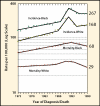Risk factors for prostate cancer
Abstract
The incidence of prostate cancer in the United States has recently undergone dramatic and unprecedented changes. Exposure to prostate-specific antigen testing has led to a steep increase in reported incidence. The data indicate that the strongest risk factors for prostate cancer are age and African American race/ethnicity. Family history is also an important risk factor for prostate cancer, although only a small proportion of cases will be due to high-penetrance genes such as those at the putative susceptibility loci (eg, ELAC2) recently identified through linkage analysis. International variation in the risk of prostate cancer is profound, as is the frequency with which migrants from low- to high-risk areas adopt the risk pattern of the host country, possibly within a single generation. This article reviews the current state of knowledge regarding risk factors for prostate cancer, including factors related to diet, anthropometrics, hormone profiles, and concomitant medical conditions. The need for unifying, overarching hypotheses is emphasized, along with identification of some of the barriers to future progress in the field.
Figures


References
-
- Etzioni R, Legler JM, Feuer EJ, et al. Cancer surveillance series: interpreting trends in prostate cancer-part III: quantifying the link between population prostate-specific antigen testing and recent declines in prostate cancer mortality. J Natl Cancer Inst. 1999;91:1033–1039. - PubMed
-
- Yatani R, Chigusa I, Akazaki K, et al. Geographic pathology of latent prostatic carcinoma. Int J Cancer. 1982;29:611–616. - PubMed
-
- Tavtigian SV, Simard J, Teng DH, et al. A candidate prostate cancer susceptibility gene at chromosome 17p. Nat Genet. 1001;27:134–135. - PubMed
-
- Stanford JL, Ostrander EA. Familial prostate cancer. Epidemiol Rev. 2001;23:19–23. - PubMed
LinkOut - more resources
Full Text Sources
Other Literature Sources
